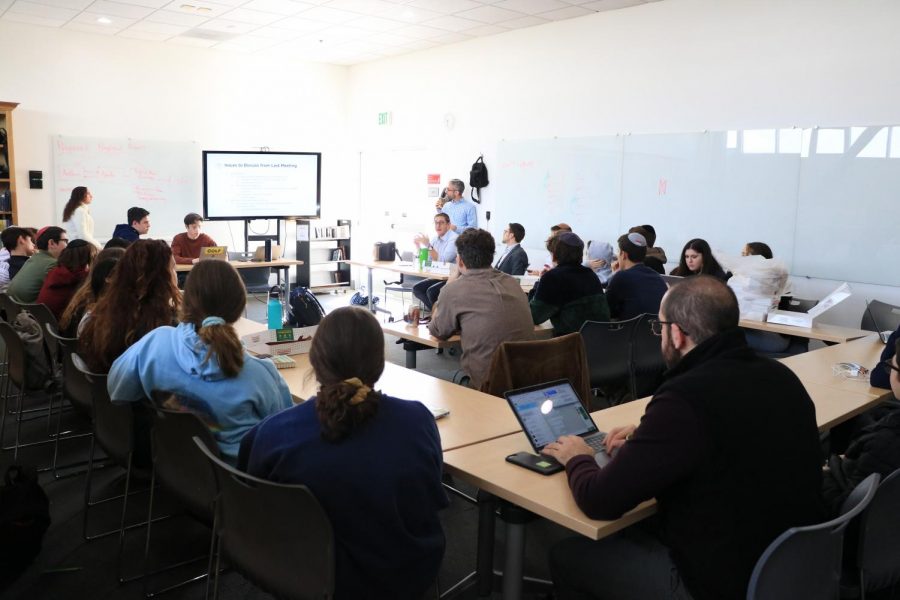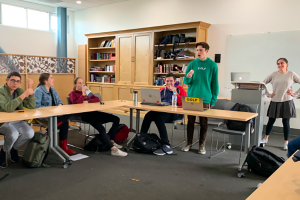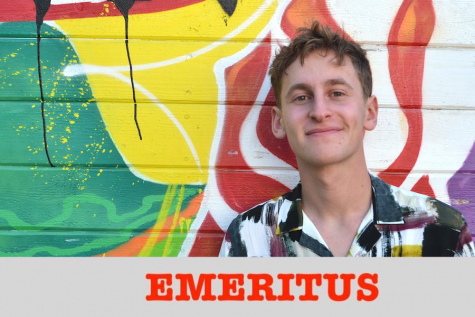Second meeting of Constitutional Convention considers whether ‘values of the school’ should be a reason to veto Town Hall proposals
BP Photo by Vivienne Schlussel
REVISE: Evan Rubel, Sabrina Jahan and David Edwards shared a light moment at a meeting on proposed updates to the constitution. Considered the start of an ongoing constitutional convention, the meeting took place Dec. 18 in room 304
January 30, 2020
Participants at the second meeting of the school Constitutional Convention Dec. 18 tried to decide the role of the head of school on the new Judicial Review Committee that was proposed at the first meeting.
A Judicial Review Committee — to decide whether proposals may or may not be discussed at Town Hall — has not existed at school at least since 2004, although it was part of the original Just Community Constitution. Reviving it was proposed by Convention leaders at their first meeting Nov. 20.
The revived committee would review all proposals before they could be presented to Town Hall, and could veto them in advance if they conflict with one of the three realms which have never been open to debate of the community: halacha (Jewish law), American law, or pedagogy.
The main topic of contention was a fourth realm it hopes to add — the “values of the school.” In other words, no proposal that conflicted with the values of the school would be allowed to be debated.
A debate over the meaning of this phrase took up nearly the entire second meeting.
Head of School Rabbi Segal said that he did not think it was necessary to have a committee which could decide that a rule was against the values of the school. He said the values should be changing as defined by students in Town Hall.
“From my perspective, the image of the school or the raw values of the school is exactly what should be debated by the student body,” said Rabbi Segal.
A revival of the Judicial Review Committee was proposed at the earlier Convention meeting, suggesting that all proposals would have to be reviewed before debated in Town Hall. Neither outgoing Head of School Rabbi Segal nor Judaic Studies principal Rabbi Block, who will become head of school next year, were present at the first meeting.
This time, Rabbi Segal, incoming head of school Rabbi David Block and Dean of Students Rabbi Ari Schwarzberg all were in attendance.
Rabbi Schwarzberg said that a list of the values of the school should be written, an idea which Zach Helfand had proposed during the previous meeting.
“If we could figure out how to write the values of the school down in a way that’s approved by a group of students and a group of faculty, then that’s what goes in there,” said Rabbi Schwarzberg. “And that like any constitution will continue to be interpreted throughout the years.”
History teacher and Fairness advisor Dr. Keith Harris said that if the values of the school were codified, there could be a point in the future in which they do not reflect the values of the school at that time.
“Is there a provision within the Constitution to allow for degrees of interpretation?” Dr. Harris asked. If not, he said, “If something comes up and someone says ‘Well it’s not in the constitution’ it just automatically just gets kicked back- veto.
“But is there something there that says ‘Well, wait a second it’s been 15 years now? We’ve changed our attitudes, we’ve changed our world views… maybe we can reinterpret something that’s in the constitution to provide for something that you hadn’t anticipated in 2019.”’
Another point of contention around the jurisdiction of the committee involved the realm of halacha, universal Jewish law, as compared to hashgacha, specific practices. Halacha is off-limits, but would Town Hall be able to consider proposals involving hashgacha — matters which would not universally be viewed as violating Jewish law?
Rabbi Segal said that while hashgacha could be discussed by Town Hall, the head of school needed to have a veto power.
Senior Zach Helfand brought up a 2018 proposal by then-senior Ilan Bouskila to allow boys to wear t-shirts, which was passed but was vetoed by the administration.
Rabbi Segal said he had “no idea” how this veto occurred at the time, but that there could not be a situation where the head of school was outvoted on a matter of halacha or hashgacha.
“That’s not a democratic option,” Rabbi Segal said Dec. 18.
An answer proposed to address halachic issues was to automatically refer them to the school’s halachic authority, which would be the head of school for smaller issues and Yeshiva University’s rosh yeshiva, Rabbi Jeremy Weider, or other specialists for more significant ones.
But the core issue of when a proposal would be considered inside the area of hashgacha was not resolved in the meeting.
Also under the new proposal, the committee would be made up of the Fairness Committee co-chairs, the Fairness advisor and the head-of-school. That would be a 50-50 split between students and administration, although this year there would be a slight edge to students since there are three Fairness co-chairs instead of two. That situation is not expected to be repeated.
The Constitutional Convention is being led by Agenda Chair David Edwards, Fairness Co-Chair Evan Rubel, and Sabrina Jahan — a senior who’s taken a strong interest in the issue. They hope to devise a new, updated version of Shalhevet’s Just Community constitution, first written in 2002 document and no longer closely followed.















